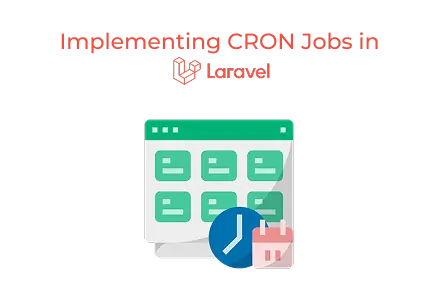Home - Scripts - Website Development

Laravel's task scheduler helps developers run automated jobs easily with just one CRON entry, saving time, reducing effort and boosting app performance.
Key Points
Scheduled tasks are crucial for many web applications — whether it’s sending emails, generating reports, or clearing caches. Laravel, a leading PHP framework widely used in custom web app development and web development services, makes it easy to manage CRON jobs using its built-in Task Scheduling feature.
Instead of creating multiple CRON entries for different tasks, Laravel requires only one CRON job to handle them all efficiently, making it ideal for teams in any web development company or mobile app development firm managing automation at scale.
Laravel's scheduler offers a clean, expressive API to define scheduled tasks. You no longer need to rely solely on system-level CRON entries. Instead, define your tasks in Laravel’s Kernel.php, and let the framework handle the rest.
Before implementing Laravel CRON jobs, ensure the following:
This setup is suitable for both local development and production deployments in enterprise-level web development services.
Use Laravel’s Artisan CLI to generate your custom scheduled command:
This command creates a new file at:
Open ExampleCron.php and insert the logic for your scheduled task:
This command logs a timestamp when run. You can replace the logic with anything, such as sending notifications, syncing APIs, or updating records — all common features in custom web app development.
Navigate to app/Console/Kernel.php and perform the following:
Define the scheduling logic within the schedule() method:
->everyMinute()
Runs the task every minute.
->hourly()
Runs the task once every hour.
->dailyAt('13:00')
Runs the task daily at 1:00 PM.
->weekly()
Runs the task once every week.
->mondays()
Runs the task every Monday.
->cron('0 0 * * *')
Runs the task using a custom CRON expression.
->timezone('Asia/Kolkata')
Sets the timezone for the scheduled task.
These methods make Laravel ideal for time-based automation in web development company workflows.
Run your CRON job manually to ensure it works:
Check Laravel’s logs:
This confirms that the command is running and your logic is being executed.
Now, configure your server’s system-level CRON to trigger Laravel’s scheduler every minute.
Open the crontab editor:
Add the following line:
This line ensures Laravel checks its schedule every minute and runs only the tasks that are due.
Note: This is the only CRON job you’ll ever need to set on your server for all scheduled tasks in Laravel — a huge advantage for scaling web development services.
Your CRON job is now live and automated. To monitor:
Scheduled jobs are a key requirement in modern custom web app development. Examples include:
Such features enhance the performance and functionality of mobile and web applications, making them more reliable and scalable for real-world usage.
Implementing CRON jobs in Laravel using the built-in scheduler is not only efficient but also scalable. With just one system CRON entry, you can manage all scheduled operations within your Laravel application.
This makes Laravel a go-to choice for developers and agencies offering web development services, mobile app development, or working at a professional web development company. Whether you're managing a SaaS app, a custom enterprise solution, or a mobile backend, Laravel’s scheduler offers both simplicity and power.

©2026Digittrix Infotech Private Limited , All rights reserved.